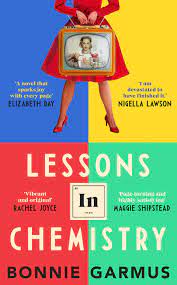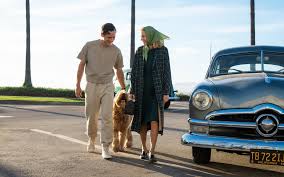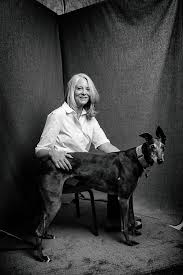
When I was thinking about this review, I searched for something from the professionals, and came across this, from Stephanie Merrit in The Guardian. Merrit is the real name of the very fabulous S J Parris, writer of the Bruno Giordano historical detective thrillers. And just like in those books, she is right on the money regarding this new novel from Bonnie Garmus. This is how she starts her review:
“Every now and again, a first novel appears in a flurry of hype and big-name TV deals, and before the end of the first chapter you do a little air-punch because for once it’s all completely justified. Lessons in Chemistry, by former copywriter Bonnie Garmus, is that rare beast; a polished, funny, thought-provoking story, wearing its research lightly but confidently, and with sentences so stylishly turned it’s hard to believe it’s a debut.”
She’s exactly right. I started the book, primed and ready to savour its shortcomings. Not, I hasten to add, because I’m that kind of sour, narrow minded, mean spirited kind of person, you understand. No, simply because it’s an experience so common that it becomes an expectation. A couple of times a year, at least, a book rockets into the Literary Heavens, seemingly out of nowhere, and becomes the “Next Big Thing”. It’s endlessly tweeted about, suddenly all the weekend papers are splashing interviews with the author, and, in a sure fire sign that this is a genuine publishing phenomenon, it gets traction in mass market publications. The writer appears on the One Show, it’s featured in Hello! Magazine, and lo and behold, Reece Witherspoon has bought the rights and is making a 5 part mini series that can only be seen via some new streaming platform that requires you to take out yet another £9.99 monthly subscription.
I often read these literary meteors while they are still burning brightly. This is partly out of an interest in the Literary world in general, partly in an attempt to discern what the secret is to writing a best seller (though to be honest, I’d be happy with finding what the secret is to writing anything that other people – that’s people I don’t know, personally or professionally- might quite like. Maybe even read to the end of, one day. Well, one can dream.) And almost always, the result is the same. The book stinks.
OK, that’s a little harsh. Stinks is maybe pushing it. How about, the book is a little dull. A little obvious. A little lowest common denominator. A little, a book written for people who don’t really like books, in the same way that Ed Sheeran writes music for people who don’t really like music. Stop it. I’m just being deliberately waspish now. It is a weakness of mine. I often give into it and write damning reviews of these meretricious page turners, sarcastic and withering, condescending and judgemental by turns.
This has become so common, I was beginning to fear it was indicative, not of falling standards in the literary world, but of a propensity to clever cleverness on my part. Not wanting to be perceived as being a part of the common herd, who fall for any old rubbish as long as it’s being featured in the media. These lumpen members of the herd are incapable of forming an independent opinion of their own, having such atrophied powers of analysis and comparison that they can never step out from the pack and say what they think before checking it against the approved opinion. Was I just signalling my own credibility as a cultural consumer by automatically damning the latest literary blockbuster without even reading it?

Still from forthcoming Apple TV adaptation, above right
With all of this in mind, it’s a relief and a pleasure to report that I can fear no more. It’s official – this is A Good Book. By the end, admittedly, it’s flaws have become more obvious, but the opening is so convincing, so welcoming, so right, that one forgives even the most jarring of errors that emerge as the story unfolds. Set in the dark ages of the early sixties, when the USA, outside of New York and San Francisco, was a stultifying, homogenous sludge of conformity. The promised land if you were male, white and Christian. A treadmill of lowered expectations and domestic thraldom if not. Particularly for women. And it’s that group who the book is primarily concerned with, via a series of likeable characters who the reader is rooting for right from the get go. The obstacles faced by the protagonist, the intelligent, resourceful, attractive career woman, Elizabeth Zott, are petty, ubiquitous and insuperable. It seems barely credible to our twenty first century eyes that such talent was so routinely and unthinkingly suppressed. Of course, we know the story. We know the progress that has been made. But it still has the power to shock and disturb when we see it dramatically presented through the operations of a woman we instinctively warm to.

So the setting, characters, relationships, plot and themes all tick boxes. This is a book that, from the beginning, enlists our sympathy and support. But often, even such a list of positives is not enough. The clincher in Lessons in Chemistry is the prose style. It’s gorgeous. Immaculate sentence after immaculate sentence aggregate into a steadily growing mound of pleasure: precise, economical, engaging. This is not firework prose. It’s not meretricious. It doesn’t show off, or shout its own virtues to the heavens. Instead, it’s quiet, unassuming and effective. It’s the sort of writing that sneaks up on you. You pick up the book because you fancy a bit of reading, and then, before you know it, you’ve read 90 pages in a flash. It’s like a long cold glass of water when you’re thirsty – just exactly what is required. And, miraculously, all of this occurs in her debut novel.
Bonnie Garmus, above left
And ultimately, it’s that that immunises the reader against the novel’s weaknesses. The characters, although engaging, sometimes strain the reader’s credulity. I simply cannot believe that Elizabeth’s neighbour, even though she is locked in a loveless marriage, would get up at 4 am to mind Maddy, Elizabeth’s daughter, to allow Elizabeth to go rowing with her husband. The bloody minded intransigence of Zott, in the face of the nonsensical demands of 1960s American daytime TV, aimed at the only female viewer the executives recognised, the housewife, doesn’t really ring true. Nobody, except perhaps someone a fair way along the spectrum, would continue not to recognise the commercial realities of both the university research world and the daytime TV world.
The other weakness is that the plot depends on more bare faced coincidences than even old Charlie Dickens himself tried to get away with. Again, the fund of good will the book has built up with the reader by the time we reach the home strait, generates a willingness to suspend disbelief, but the rope is a little too tight by the closing scenes.

Still from upcoming Apple TV adaptation (above right)

Then we come to the thorny matter of the dog. Yes, the dog. Not the one that didn’t bark, but the one that, apparently, as the arch rationalist Gormus tells us, has a vocabulary of nearly a thousand words. The same one that comments on the predicaments of Elizabeth, Calvin, Maddie and Harriet with more wisdom, insight and emotional intelligence than any human appearing on reality TV. I love a bit of Magic Realism as much as the next Joe, but this was a bridge too far for me. And yet, it does work, no matter how ridiculous it makes you feel as a supposedly discerning adult reader. The dispassionate observer role that the dog, Six Thirty, performs does bring something significant to the table. I just don’t know what, how or why.
Garmus with her dog above left. The dog is, strangely, important
Maybe a little mystery about the mechanics of an engaging novel is a good thing every now and again. As an antidote to over analysing, perhaps one should simply experience a book, and take pleasure from it. After all, you can’t do a post mortem without killing the subject, so, just for once, let’s trust our reactions and let the book live and breathe without trying to find out why. Try it, and see whether you agree.